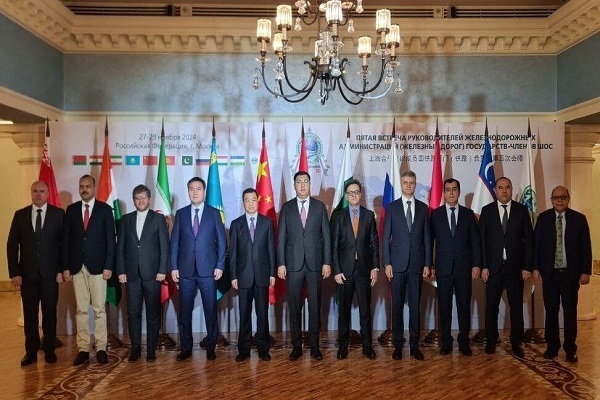Iran Pushes for Stronger Rail Ties with SCO Members at Moscow Meeting
In a bid to bolster regional connectivity and trade, Morteza Zakeri, CEO of the Islamic Republic of Iran Railways, emphasized Iran’s commitment to enhancing transportation links within the Shanghai Cooperation Organization (SCO) during a key summit in Moscow.
Trilateral Cooperation and Streamlined Trade
Addressing fellow rail heads at the 5th meeting of the SCO railways, Zakeri proposed a trilateral meeting involving Iran, Russia, and the Republic of Azerbaijan to harmonize tariffs and energize freight transportation in the region. Additionally, he called for the formation of a specialized working group to tackle key issues. This group would focus on identifying and removing obstacles in border areas, evaluating routes not yet integrated into existing rail networks, and crafting a compelling financial model to attract critical investment for the construction of these new routes.
Iran: A Bridge Connecting East and West
“Iran, strategically situated as a bridge between East and West Asia, and a vital connector between Europe and Asia, is dedicated to strengthening partnerships and collaboration in transit and logistics with SCO member countries,” Zakeri stated, highlighting Iran’s pivotal geographic location.
He underscored the critical role of fostering both bilateral and multilateral cooperation in transportation and transit. “Emphasis must be placed on promoting east-west and north-south transit routes that pass through Iran,” Zakeri asserted.
Unlocking the Potential of the North-South Intercontinental Corridor
Zakeri highlighted the North-South Intercontinental Corridor as a cornerstone of regional connectivity. This ambitious project incorporates several key routes: the Southern Belt Pass, linking China to Europe; the Almaty-Bandar Abbas Pass; the Almaty-Tehran-Istanbul Rail Pass; and the Islamabad-Tehran-Istanbul Corridor. “Iran Railways is actively working to enhance international crossings from Iran by refining conditions, streamlining logistics, and expanding the capacity needed for transporting goods from China, Russia, and Central Asian countries to Iran, India, Pakistan, and Europe,” he explained.
Recognizing the importance of the North-South Corridor, Zakeri revealed that high-level discussions between Iranian and Russian officials are underway to finalize the construction of the Rasht-Astara railway line in Iran, a critical segment of this crucial transit route.
Expanding Iran’s Rail Network to the Coast
The CEO also highlighted the significance of the Zahedan-Chabahar railway project, describing it as one of the largest and most strategic railway initiatives in Iran. “Once completed, this project will connect Iran’s railway network to a key oceanic port in the southeast, located on the coast of the Oman Sea, Zakeri explained. “This connection will significantly facilitate the transportation and transit of goods from India to Afghanistan and Central Asian countries via the Iranian rail network.”
What are the specific challenges Iran faces in developing its rail infrastructure within the SCO framework?
## Interview: Iran Seeks to Be Rail Hub in the SCO
**Host:** Welcome back to the program. Joining us today is Dr. Alireza Shirazi, an expert on Middle Eastern geopolitics and economics. Dr. Shirazi, Iran recently participated in a key meeting of the Shanghai Cooperation Organization, focusing on railway development. Can you shed some light on what transpired, and what it means for Iran’s role in the region?
**Dr. Shirazi:** Thanks for having me. Certainly, this recent meeting in Moscow highlights Iran’s ambition to become a major transit hub within the SCO. Morteza Zakeri, the head of Iran’s rail system, outlined a vision for enhancing regional connectivity through improved rail infrastructure and streamlined trade routes.
**Host:** So, what concrete proposals did Iran put forward?
**Dr. Shirazi:** Zakeri proposed a trilateral meeting between Iran, Russia and Azerbaijan to harmonize tariffs and boost freight transportation amongst these SCO members. He also emphasized the need for a dedicated working group to address logistical challenges, assess potential new routes, and develop a financially attractive model to attract investment for their construction.
**Host:** Iran’s geographic location has often been cited as a key asset. How does this play into Iran’s strategy within the SCO?
**Dr. Shirazi:** Absolutely. As Zakeri pointed out, Iran geographically acts as a bridge between East and West Asia, connecting Europe to Asia. They’re aiming to leverage that position to facilitate increased trade and cooperation within the SCO framework. This aligns with Iran’s broader goal of diversifying its economic partnerships and reducing its reliance on a single market.
**Host:** The SCO has been expanding its membership recently, with Iran joining formally in 2022. How significant is this move for Iran, particularly in the context of railway development?
**Dr. Shirazi:** This is a very significant step for Iran. Joining the SCO allows them to access a wider market and potentially collaborate on large-scale infrastructure projects, such as railway lines that connect multiple SCO member states. [[1](https://www.reuters.com/world/middle-east/iran-signs-memorandum-joining-shanghai-cooperation-organisation-tass-2022-09-15/)]
**Host:** Thank you, Dr. Shirazi, for your insightful analysis. We’ll continue to follow this development closely.

